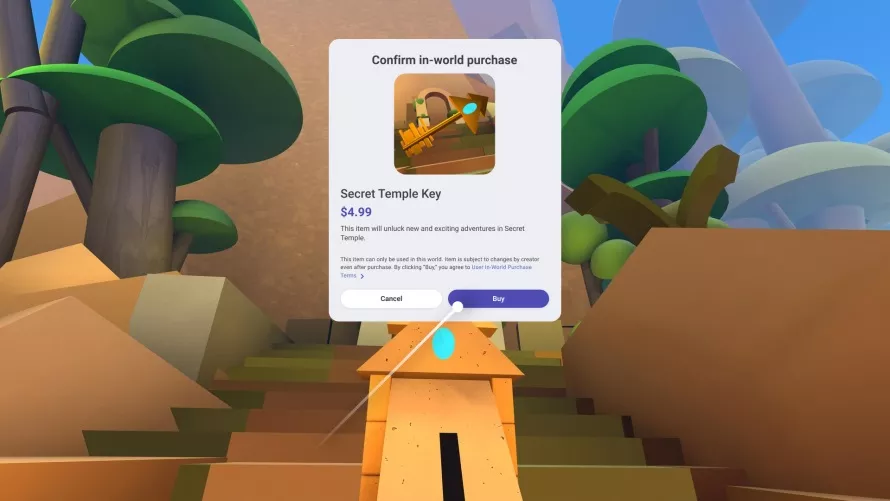Earlier this week, Meta announced in a blog post that they were rolling out new ways for developers to sell virtual assets and experiences in Horizon Worlds, which is an integral part of the company’s Metaverse plans. What they neglected to mention was their cut of the sales, which they confirmed to CNBC on Wednesday – a 30% “hardware platform fee” for sales in the Meta Quest Store and a 17.5% fee for the use of Horizon Worlds. That adds up to a staggering 47.5% which is hard to see as anything other than a war on developers.
We’ve known that Meta has been bleeding money on its XR initiatives – a $10 billion loss in 2021 with more red ink to come this year. When you hire 10,000 new AR/VR employees and don’t have a revenue plan, something has to give.
A War on Developers

It wasn’t that long ago (November 2021, to be exact) that Mark Zuckerburg was complaining about Apple taking a 30% cut of developers’ work.
As we build for the metaverse, we’re focused on unlocking opportunities for creators to make money from their work . . . The 30% fees that Apple takes on transactions make it harder to do that, so we’re updating our subscriptions product so now creators can earn more.
A 47.5% cut makes the Apple Store look like a discount shop for creators. And it didn’t take long for Apple’s spokesman Fred Sainz to respond in an email to MarketWatch.
Meta has repeatedly taken aim at Apple for charging developers a 30% commission for in-app purchases in the App Store — and have used small businesses and creators as a scapegoat at every turn. Now — Meta seeks to charge those same creators significantly more than any other platform. [Meta’s] announcement lays bare Meta’s hypocrisy. It goes to show that while they seek to use Apple’s platform for free, they happily take from the creators and small businesses that use their own.
In addition, both Apple and Google recently cut fees to 15% for developers making under one million a year. 15% or 47.5% – you can guess how developers have reacted.
Blockparty CEO Vladislav Ginzburg described how this war on developers plays out in a comment to MarketWatch:
Facebook keeps all media uploaded to it, retains all user data and owns every step of the process to sell to marketers. Rather than enable creators to share in the value they bring to Facebook, their goal is to take half of the sale. No thanks.
Others were far less charitable in their responses on Twitter.
The Future of Web3 and the Metaverse

We have a long way to go before we reach the promised land of Web3 – which ironically promises to cut out the middleman in transactions. Meta talks a lot about its “commitment to creators” and, back in 2021, promised that many products would remain commission-free, including live events, badges, and news products. But that only holds until 2023. It’s hard to see a 47.5% cut on virtual experiences as anything other than a war on developers.
The real challenge for Meta is coming up with a revenue stream that can replace the avalanche of cash generated by Facebook and Instagram. Apple doesn’t face the same challenges with its reliance on hardware sales (almost 85% of its total revenue). What they’ll do in releasing an XR device and developing a metaverse platform remains to be seen.
With Meta, will creators be happy to settle for 52.5% of sales? The one thing Meta has in its favor is its ease of use and reach in terms of the global population. But the nascent web3 developments are offering much less expensive alternatives. In the crypto space, OpenSea, the largest NFT marketplace, charges a 2.5% fee on NFT sales – and has even faced criticism for being too high. LooksRare recently undercut them by charging 2%. Granted, creating virtual experiences requires far more work than dropping some NFTs that sell based on artificial scarcity. But 47.5% may be too high a price for creators to swallow.
We’ll continue to follow this story, and let us know if you think Meta has declared war on developers.
Emory Craig is a writer, speaker, and consultant specializing in virtual reality (VR) and generative AI. With a rich background in art, new media, and higher education, he is a sought-after speaker at international conferences. Emory shares unique insights on innovation and collaborates with universities, nonprofits, businesses, and international organizations to develop transformative initiatives in XR, GenAI, and digital ethics. Passionate about harnessing the potential of cutting-edge technologies, he explores the ethical ramifications of blending the real with the virtual, sparking meaningful conversations about the future of human experience in an increasingly interconnected world.

